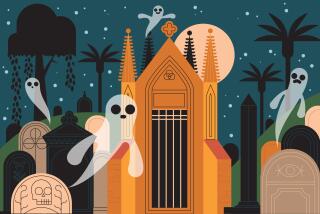A Place in History : Preservationists Seek to Save Highland Theatre, Now a Designated Monument
- Share via
The 67-year-old Highland Theatre, the last of a group of 1920s theaters that once formed the heart of Highland Park, has been designated a historic-cultural monument by the Los Angeles Cultural Heritage Commission.
Members of the Highland Park Heritage Trust, the historical preservation organization that nominated the Highland as a monument, described it as one of the outstanding examples of Moorish theater architecture in the Los Angeles area.
Designed by theater architect L.A. Smith, the Spanish-style Highland at 5600 N. Figueroa St. features arched openings, decorative tile walls and wrought-iron work on its exterior. The once-elegant interior had an orchestra pit, a working stage for vaudeville acts, large ceiling frescoes, and elaborate moldings in the shape of Spanish arches.
If approved by the Los Angeles City Council, the monument designation would mean that any plan to alter or demolish the building could be delayed for up to one year, while preservationists seek a means of saving it.
But while the outer walls of the theater are virtually the same as they were when the structure was built in 1924, the interior had already been substantially altered when it was divided into a triplex theater in 1983. The once-outdoor lobby was enclosed and the original walls in the lobby and in the theater were covered with other material.
Today, the balcony, where the frescoes and moldings are still exposed, is filthy and closed to the public. The grand chandelier that once hung over the house is lying on the floor there, covered in dust. The seat cushions have been pulled up and stacked in piles.
But Charlie Fisher, a member of the board of directors of Highland Park Heritage Trust, said the building “is restorable.”
“The original interior is still there,” he said. “Down the road, if economic conditions merit it, you could convert it back.”
Greg Akarakian, whose father has owned the theater since 1975, said his family has no plans to restore the theater to its original condition. He said that the historical preservationists who want to save the building have come into the picture too late.
“Maybe 10 years ago, they would have had a chance,” he said. “If they had shown interest before we remodeled, maybe we could have done something.”
But Fisher said the monument designation will preserve the chance that the building could be refurbished in the future.
“You don’t know what’s going to happen in 10 years,” he said. “They may be able to convert it back.”
In documentation submitted with its nomination, the Heritage Trust said the Highland was the largest and most elegant of a cluster of six theaters that formed the cultural heart of Highland Park. Its opening was a grand occasion, with an appearance by the silent film star Norma Shearer.
“This technically was probably the finest building for a theater that Highland Park ever had,” said Tom Owen, a local history specialist for the city’s Central Library downtown. “This would have been the major point in town for entertainment.”
Later though, the theater and others in Highland Park fell on hard times as movie attendance dropped. Gradually, the others closed and, by 1963, the Highland was the only one left.
In their struggle to keep the Highland open, the operators briefly showed pornographic films and Spanish-language movies, Akarakian said. The triplex now shows first-run feature films.
More to Read
Sign up for Essential California
The most important California stories and recommendations in your inbox every morning.
You may occasionally receive promotional content from the Los Angeles Times.










